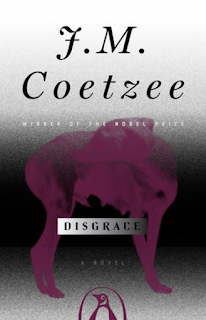Disgrace
DISGRACE
by J.M. Coetzee
Awards: Booker Award 1999, Nobel Winner 1999
Nominations: Dublin Longlist 2001, National Book Critics Circle Finalist 1999, NY Times Finalist 1999
Read Date: January 8, 2023
An older, twice-divorced professor living in South Africa finds himself embroiled in a scandal. Dr. David Lurie, by no means past his prime, has randomly found himself besotted with one of his students. His downfall? She makes herself available to him, never saying no. Then again, she never seems to enjoy their brief encounters and basically endures all of their liaisons. I never understood why she would go along with this unless she felt her academic future was in jeopardy if she didn’t comply?
Regardless, Coetzee has created another masterpiece here, diverting readers with this preliminary affair. After the student files a complaint with the university, David’s secret is laid bare for all his colleagues to dissect. In disgrace (hence the title), he resigns in a fit of pique. His reasons for not putting up a defense seem vague and entirely rooted in a humanist “humans do human things” kind of reasoning.
With nothing but time on his hands, David heads to his daughter Lucy, who lives on a rural farm and has a market garden, boards dogs and, in the past, has created pottery and other object d’arte for tourists to support herself. After a brief time of being with his daughter, Lucy and David are the victims of a brutal home invasions that results in Lucy being raped, David being doused in alcohol and set on fire and various possessions being stolen. The trauma of this violence impacts their relationships and the relationships of their local friends in profound ways. Of course this goes without saying, but Coetzee is able to convey this impact in a way that just confounds me.
Disgrace is the fourth novel I’ve read from Coetzee and I am just gob smacked by his creativity, insight into the human experience and ability to convey complex principles with such ingenuity. This isn’t saying much, as the man won the Nobel for goodness sakes, but I love sipping at the altar of next-level ability.
For my future self, I want to add that I don’t fully understand Lucy’s reasoning for not saying she was raped by black men. She seems to believe that she deserves what happened or it’s the price she should pay for being in possession of occupied land. This is such a complex issue that no one solution is obvious but perpetuating violence knowingly or unknowingly is unacceptable. Ugh! Damn you Coetzee!




Comments
Post a Comment